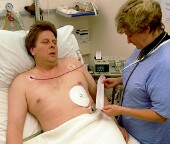

New Blood Test May Predict Heart Attack
In small study, high levels of misshapen cells from vessel walls spelled trouble
By Denise Mann
HealthDay Reporter
WEDNESDAY, March 21 (HealthDay News) -- A new blood test may be able to predict a heart attack before it actually happens, the test's developers claim.
Doctors traditionally rely on treadmill stress tests to predict heart attacks. These tests can tell if there is a blockage in the coronary arteries, but can't determine whether or when the blockage will rupture and cause a heart attack.
Enter the new blood test.
Individuals with high levels of misshapen circulating endothelial cells (CECs) coming from the lining of blood vessels may be at imminent risk for having a heart attack, the researchers report.
"The ability to diagnose an imminent heart attack has long been considered the holy grail of cardiovascular medicine," study author Dr. Eric Topol, of Scripps Translational Science Institute in San Diego, said in a statement. He has a patent on the technology used to measure CECs.
The findings appear in the March 21 issue of the journal Science Translational Medicine.
The study included 50 heart attack patients and 44 healthy volunteers. Researchers used fluorescent images to show that CECs from heart attack patients look much different those seen in healthy individuals. According to the study, the number of these blood cells seen in people at risk for heart attack may be more than 400 percent higher than in healthy people.
"This may be a novel biomarker for heart attack risk," said Dr. Suzanne Steinbaum, director of women and heart disease at Lenox Hill Hospital, in New York City. But "the new test is not ready for prime time."
Unless and until more studies confirm the test's ability to predict heart attack, she said, "prevention really comes down to managing risk factors for heart attack." This includes eating a healthy diet, making sure blood pressure and cholesterol are where they should be, not smoking and exercising regularly.
Dr. Barry Kaplan, vice chairman of cardiology at North Shore University Hospital in Manhasset, N.Y., and Long Island Jewish Medical Center in New Hyde Park, N.Y, agreed that more study is needed to validate what role this new test can have in predicting heart attack.
"It may have potential to be predictive, but we do not know when these cells become abnormal in relation to when a heart attack occurs," he said. "All we have now is decreasing risks, particularly cigarette smoking and cholesterol levels. This is the best way to decrease the probability of a plaque rupture that will cause a heart attack."
More information
Learn more about heart attack risks at the U.S. National Heart, Lung, and Blood Institute.
(SOURCES: Barry Kaplan, M.D., vice chairman, cardiology, North Shore University Hospital, Manhasset, N.Y., and Long Island Jewish Medical Center, New Hyde Park, N.Y; Suzanne Steinbaum, DO, director, women and heart disease, Lenox Hill Hospital, New York City; March 21, 2012, Science Translational Medicine )
Copyright © 2012 HealthDay. All rights reserved.
HealthDay news articles are derived from various sources and do not reflect federal policy. Womenshealth.gov does not endorse opinions, products, or services that may appear in news stories.
womenshealth.gov
A federal government website managed by the Office on Women's Health in the Office of the Assistant Secretary for Health at the U.S. Department of Health and Human Services.
200 Independence Avenue, S.W. • Washington, DC 20201


 Text size
Text size Email
Email
